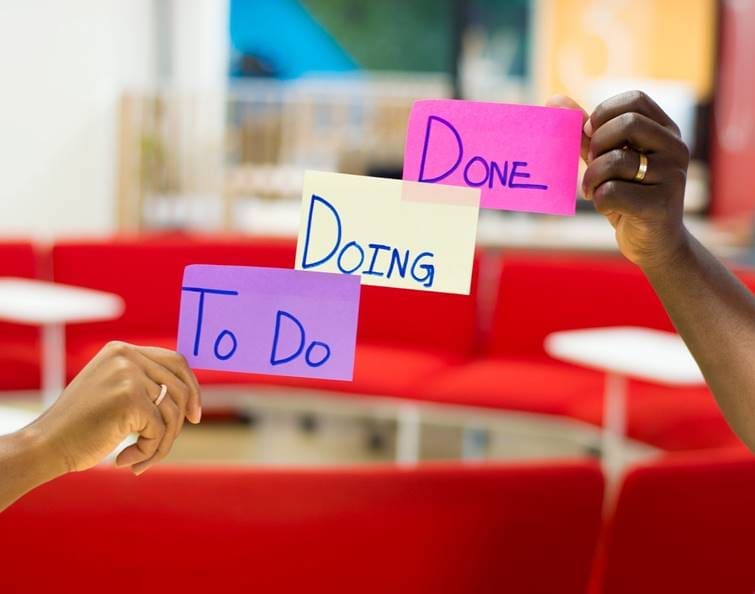Hey, give this a read will ya?
Every Upstacker dreams of a world where non-tech founders don’t make app development mistakes.
We love meeting founders who’ve clearly done their research and can ask the right questions.
Sadly, that’s not often the case.
We don’t want to point fingers, but we’ve had our share of clients who made very costly decisions that they came to regret.
And so, to make the lives of non-tech founders a bit easier, our team put together a free eBook based on first-hand experiences over the past five years.
Ta-daa!

If you’re a non-tech founder, it’s an excellent kick to the gonads on avoiding common app development mistakes that cost you dearly.
About to build your first app or trying to figure out how to make the next project smoother?
Meanwhile, we’d like to do a deeper dive into the worst app development mistake of the seven: Failing to learn software project management.
Why It’s The Worst App Development Mistake
Here’s a harsh truth: most apps fail.
Every new app is a salmon swimming upstream. You’re already going against the current, and most just won’t make it.
As founders and developers, we try our best to avoid the hungry grizzly bears along the way.
Those are the mistakes that needlessly take chunks out of your limited resources.
Founders who don’t learn how to manage software development projects become their own grizzly bears. They end up eating into morale, time, and budgets, causing projects to stall and even sink.
For a very understandable reason, it’s something non-tech founders tend to be guilty of
The Non-Tech Founder Dilemma
We love you, but sometimes you drive us nuts!
To be fair, we understand the difficult situation you’re in.
Non-tech founders completely rely on developers to deliver on the technical side of things. You are placing your million-dollar idea in someone else’s hands.
Sometimes non-tech founders know how to pull it off.
Most times, we notice that they gravitate towards the extremes of two mindsets.
#1: I’m going to trust my developers completely.
They don’t concern themselves with any technical details and only want progress updates and high-level instructions, They don’t know what they want, and they’re happy to let developers do all the thinking.
They want to be able to pay upfront costs and then come back in a year to collect a fully finished app.
Then they feel betrayed when there’s no app waiting.
#2: I’m not going to trust the developers at all.
They want to call every day to make sure things are going well. We might even mistake them for a programming language since they’re wrapped around our necks like Python.
A bad idea in general, but especially bad when the people you’re grilling know more than you.
Upstackers welcome involvement from our non-tech founders – wherever practical and productive. That’s how project management skills will serve you well.
So here are the dos and don’ts of software project management for non-tech founders. Follow these and you and your developer will have a wonderful working relationship.
Do: understand app development methodology and stages
Methodology is how the team will move through the various stages of app development.

Your developer should advise you on what methodology to use before the project even begins. Before you agree, understand what it means for your communication and product development processes.
For example, two of the most popular options are Agile and Waterfall, and they’re complete opposites. One is all about product iteration, while the other is focused on getting it right the first time.
After methodology comes the app development stages.
Here’s ours:
- Requirements Gathering
- UI/UX Design
- Backend and Frontend Development
- QA & Testing
- Launch
- Iterate & Maintain
Understand what each of these stages involves, and how long it takes to build an app.
Stage 2 is especially important. It’s the design stage, and you don’t want the developer cutting corners.
If something gets missed out here, there’s a good chance you won’t get the app you want.
When you meet a developer, ask them to explain their methodology and UI/UX research methods and timeframe. If it sounds good to you, hold them to it (with some flexibility).
Don’t: try to become a technical founder
If you’re thinking of learning code and design to better manage your developers, you definitely have better ways to spend your time.
Again, a harsh truth: Our technical expertise is what you’re paying us for.
The most junior staff at an agency will likely have better technical knowledge than you, and they’re also being guided by senior staff with even more knowledge and experience.
The chances of a non-tech founder correcting a senior developer on a technical point are quite slim.
What might happen is you put your team in an awkward situation where they need to politely explain why your suggestions can’t work.
As long as you understand their methodology and where your project is in the development process, debates about the technical nitty-gritty get everyone nowhere fast.
This is where you let your developers earn their pay.
Do: Keep healthy communication lines
This is part of why we highly recommend Agile methodology for non-tech founders.
Instead of collecting a finished product a year later, founders join the development process.
You get to test out your product and features on real users as soon as possible. Then you can request changes based on their feedback.
New iteration > Feedback > Request new changes.
So on and so on, until you have your initial market-ready product.
It keeps you and your developers in regular contact and is just a great way of keeping everyone accountable and motivated.
Don’t: Use communication to micromanage
If you’re calling your developer every hour to know if everything’s alright, time to calm down.
App development may occur as a series of sprints, but it’s ultimately a marathon.
It’s one thing to call to voice a concern or raise a bug you’ve discovered. In fact, we deeply appreciate you taking an active role in testing!
It’s quite another thing to request project updates at intervals that don’t make sense.

Or to call multiple times to report the same bug.
Nothing happened between 9 and 10 am this morning because nothing was supposed to.
The bug hasn’t been fixed because we’re talking to you instead of fixing it.
There’s nothing new during weekly meetings since we’ve already told you everything over daily calls.
No one likes the feeling of being scrutinised for no reason.
Competent and motivated workers work best given enough breathing room. Set weekly stand-ups with your developer, and only break from that when necessary.
Do: be flexible with impossible deadlines
It doesn’t matter how sure you are of what the product needs now.
It will change halfway. Every. Single. Time.

We hate to sound like a broken record, but it’s why we love Agile.
It lays the foundation to make those changes happen as smoothly as possible.
It’s not an app development mistake: It’s just the nature of solving customers’ problems: they don’t know what they want.
As we discover how to best serve them, there will be changes to requirements that inevitably push deadlines back.
As long as the reason is legitimate, everyone just has to roll with the punches.
One thing though. If you’re going to approach investors by certain dates, tell your developer so you can align priorities.
Don’t: be flexible with delays due to negligence
The new iteration’s been pushed back a week because customers suddenly really want an extra feature?
No problem.
Same delay because a developer forgot to add in that extra feature?
Oh hell naw.
Negligence is one thing you never want to be the cause of delays. That would definitely count as an app development mistake.
If your developer is prone to negligence, you need to find out early in the development process.
You’ll need to have a painful discussion about potentially switching developers.
But at least you have that option.
Realise too late and you may be in too deep with the current developers to switch.
You may end up forced to go with a developer that will take longer and more money than necessary.
Am I ready to manage app development projects now?
The short answer is no.

Sorry, but nothing will ever beat first-hand experience.
The longer answer is not yet.
Our hope is that with the information in this article, your learning process gets accelerated.
And you know what would really accelerate that progress?
A recap of the worst app development mistake
Do:
- Understand app development methodologies and the stages of app development
- Set a weekly meeting with your app developer to align priorities
- Get intimately involved with testing and feedback gathering
- Allow for changing deadlines due to changing requirements
- Schedule a strategy session with us!
Don’t:
- Debate your developers on technical details
- Request unnecessarily frequent updates (seriously let us have a life!)
- Allow repeated negligence that stalls progress
And that’s it from us on project management. Now you’ve learned to avoid the worst app development mistake, time to avoid the rest of them!





